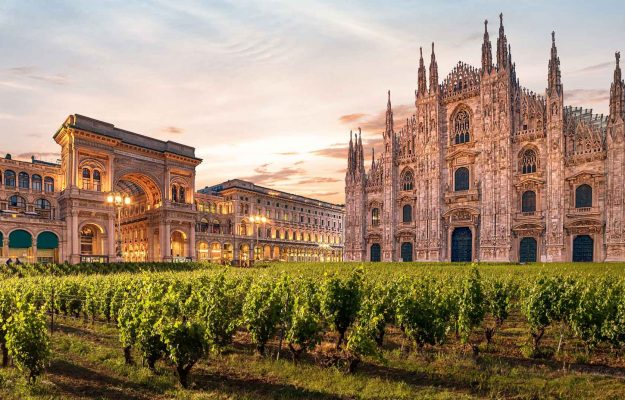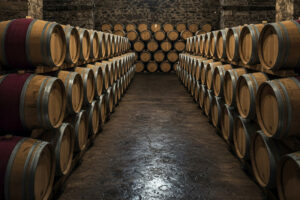Increasing the value of Italian wine: a mantra, now, a necessary mission, difficult but not impossible, but to be completed in the shortest possible time, to grow the territories, to create value, to have resources to invest in the growth of companies, promotion, quality. But, in addition to time, it is necessary to have the courage to invest in new vines and territories for the market - and not only in those already established and successful - of which Italy is particularly rich, to overcome the atavistic inability to move together, as a system, but also to recover the pride of being Italian in the best sense, that is craftsmen dedicated to the good and the beauty. This is the message that comes from the conference of the “Milano Wine Week” (from today to October 13), where, moderated by the editor-in-chief of the “Corriere delle Sera” Luciano Ferrario, leading producers and consortia on the Italian scene met. Starting from the data (source Nomisma Wine Monitor, ed.), really merciless, looking at the U.S. market, where Italy, however, is the leader in volume and quantity: French red wines go to the U.S. at an average price of 6 euros per liter, Italians at 4.6. On PDO, the range is even wider: 9.1 euros per liter for the French, 5.5 for Italy. There is no match for bubbles: 17 euros per liter for French sparkling wines, less than 4 euros for Italian sparkling wines. “often the wine sector has not been supported as it deserves for what it can represent - stressed the president of Coldiretti, Ettore Prandini - and initiatives such as the Milano Wine Week, in a city with a strong international projection, can be important. We, as Coldiretti, have set up our own “Filiera Italia” to work on this aspect of value growth, involving Ice and Cassa Depositi e prestiti, to really support investments in emerging markets, but also consolidated ones, which must never be forgotten”. Of course, increasing the value of wine, or the price recognized, is not a small matter.
“We should not underestimate time, considering that the French have a few centuries of advantage - said Riccardo Pasqua, head of the Veneto group - but we also need to go in one direction, explain the quality of our wine, which has everything to be second to none, educating the trade and the consumer, also talking to young people, and this Milano Wine Week is an example. And increasingly fundamental is also the synergy between wine and other luxury and top-of-the-range realities”.
Ettore Nicoletto, from Santa Margherita Gruppo Vinicolo, stressed, “There is no common glue, no aegis that would make wine speak a single language, and that would, for example, underline its great gastronomic versatility and pairing, which is of great interest to young consumers. Another aspect that has not been mentioned, then, is that we, as Italians, have a tendency to insist on what is particularly good, such as Prosecco and Pinot Grigio, for example, and all those who can concentrate on the success of that, crowding the category, triggering a price war, making private labels grow, and gradually pulling everything down. Italy must have courage: it is the country of the natives, it is the country of beauty, we must have the courage to find new successful vines, I'm thinking of Vermentino and Lugana, even if they are part of it, or the Primitivo di Puglia, for example. We need the courage to build new things, and also to invest money in them”.
“We have to do “story telling” - added Simonpietro Felice, at the helm of the Cantine Leonardo Da Vinci - about the vine, the territory, the brand and everything that revolves around it. Leonardo Da Vinci is an example, it tells of the Italian ability to work on wine already 500 years ago, which is not told”.
“But we need producers to team up - added Alberto Serena, at the top of Montelvini - and then we need consistency on price positioning, because the war with prices only leads to impoverish everything, to the advantage of private labels. It's a risk that exists, even in the Prosecco world, and we risk positioning it more and more downwards”.
“If a young man were asked how to do storytelling, he would perhaps focus on innovation, especially in the tools, rather than in the message - stressed Cristina Ziliani, head of the Franciacorta Berlucchi brand - because it is necessary to tell the story of the territory, the values, open companies, open to gastronomy, to the many local cuisines”.
Another aspect on which we must focus, is the synergy with other excellences of Made in Italy, “from design to food, to boating - said Matteo Lunelli, at the helm of the Ferrari-Fratelli Lunelli group - it is fundamental. Courage and pride are needed to aim for a different, higher price positioning, which then serves to invest. Rather than selling out, we need to communicate, tell, and build brands, because Docs are fundamental, but we need brands that promote them and shift competition in quality and price”.
To grow in values, of course, it is necessary to invest in markets, “which are all important - said Roberta Corrà, general manager of the Gruppo Italiano Vini (Giv) - because the emerging ones are a potential to be discovered, but require a long work, while the mature ones are those who support us, and we can not leave out. What Italian wine lacks today is the ability to create synergy, with fashion, with cuisine, with territories, today we have to talk about wine to everyone, but often we talk to each other”.
And another great lack, according to Vittorio Moretti, at the head of the Terra Moretti Group, is that of awareness of one’s own strength. “We are unaware of who we are. We are Italian, we live in the most beautiful place in the world, art and culture make us first, but often we are flattened on the quantities. We are the best craftsmen in the world, and craftsmanship means something that is done with our hands and passion, it means being aware of having an important product in our hands. We have given too much string to the traders, who have made disasters”.
And on the need to make a system, to be cohesive, but also to focus on the culture of Italian wine, but also on its versatility, also agree the leaders of important consortia of Italy, from that of Franciacorta, led by Silvano Brescianini, to that of Prosecco Doc, directed by Luca Giavi, from that of Conegliano Valdobbiadene Prosecco Superiore Docg, chaired by Innocente Nardi, to that of the Doc of Friuli Venezia Giulia, led by Adriano Gigante.
A way of seeing things that, it seems, unites all Italian wine. And, therefore, all that remains is to pass from words to deeds.
Copyright © 2000/2026
Contatti: info@winenews.it
Seguici anche su Twitter: @WineNewsIt
Seguici anche su Facebook: @winenewsit
Questo articolo è tratto dall'archivio di WineNews - Tutti i diritti riservati - Copyright © 2000/2026







































































































































































































